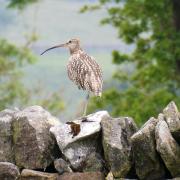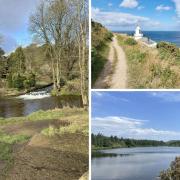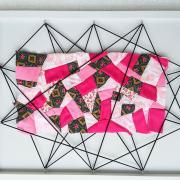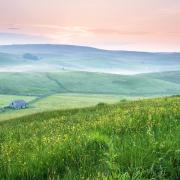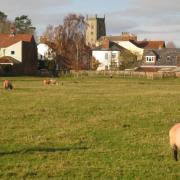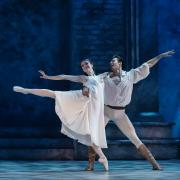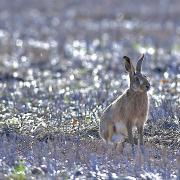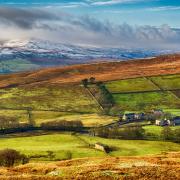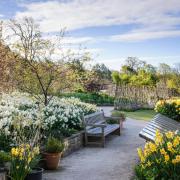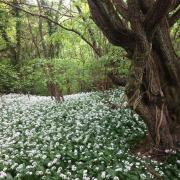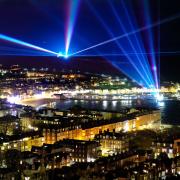Journalist headlines Harrogate History Festival at The Old Swan Hotel from October 23rd-26th
If Strictly Come Dancing is looking for an extra competitor this year, they could do worse than call on former Newsnight anchor Peter Snow.
He began his National Service with the light infantry just outside York, making the most of the city’s Clarence Street ballroom: ‘It was great fun charging into the ballroom. We’d go and dance with the local women, which was enormous fun. I got to know and love York very much; it’s the most beautiful city.’
Fun isn’t necessarily the first word that springs to mind when you think of BBC foreign correspondents and political pundits, but anyone who has seen Snow in action on Newsnight or Tomorrow’s World knows he’s a mould-breaking journalist.
His jovial enthusiasm has famously brought general elections to life, with a little help from his trusty swingometer. (‘It’s not faded,’ he booms.)
But going back to his days in Yorkshire during the 1950s, it wasn’t just the cha-cha-cha that caught his interest; the rich history of York also played its part.
‘It was the great Roman capital of Britain, and Yorkshire is such a part of British history from the Romans to the War of the Roses – you name it,’ he said. ‘It’s just as interesting and exciting as the south and London.’
He’s returning to Yorkshire this month as one of Britain’s leading military historians, headlining Harrogate History Festival at The Old Swan Hotel from October 23rd-26th.
Joining him are veritable giants of the genre including Bernard Cornwell, Elizabeth Chadwick, James Naughtie, Sandi Toksvig, Sarah Dunant, SJ Parris, CJ Sansom, Irving Finkel and former adventurer and English teacher Conn Iggulden, whose Dangerous Book for Boys became a worldwide phenomenon.
Peter will be talking about his book, When Britain Burned the White House, and, when he spoke to us on the phone, was in the States to mark the bicentenary weekend of the burning of Washington.
‘It happened on this very day in 1814,’ he said. ‘I’m attending a re-enactment, but you can be reassured they won’t be burning the White House down again.’
The burning of Washington was a moment almost lost to history, overshadowed in Britain by the Napoleonic War. The Americans felt Britain’s war with France interfered with their trade, and they resented British support of American Indian tribes. As a consequence, Major General Robert Ross led 4,500 men from Britain to give the Americans ‘a good drubbing’. They were hardened already by war, and the Americans fled.
‘It was a dreadful moment for them,’ said Peter. ‘They had to abandon the White House, even the President’s wife Dolley, who was a brilliant character, had to flee.’
President Madison had been so confident he’d laid on a victory supper for his generals. Instead, the Brits ate the supper, piled their chairs on the table and set them alight.
‘I’ve visited the White House and seen the burn marks,’ said Peter, adding that when David Cameron visited the White House in 2012, President Obama joked that his countrymen had once ‘really lit the place up’.
‘It’s extraordinary that Britain, with its special relationship with America today, would once burn down its shrine to democracy.’
Snow’s father was a military man and his grandfather a First World War general. Did they inspire his fascination with military history?
‘Partly, I think. Although I was a soldier for two years, I never saw myself as a soldier. What really got me going was when I got to ITN and the BBC specialising in defence and foreign affairs. I spent time abroad in war zones and did lots of illustrations and explanations of the Falklands, Northern Ireland and Vietnam. The military became part of my every day work as a journalist.
‘I left Newsnight in 1997 but I’ve done programmes with my son Dan on military history and that led me to write a book on the Duke of Wellington, and now, the White House.’
After reporting on the daily horrors of war, how does he maintain such enthusiasm for the subject?
‘I don’t think that’s a problem,’ he said. ‘You get moved and horrified by what you see in war zones but, at the same time, it’s a different part of your character that’s enthused about the work. The enthusiasm is reporting the story. It’s the art of explaining and communicating that exact moment with people and telling them what it’s about.
‘It’s important not to let your own feelings and views get in the way, about whether it’s right or wrong. You dispassionately communicate a story and let the viewer draw their own conclusions.’
What then did he think when his cousin Jon Snow gave an impassioned plea to viewers to support the victims in Gaza on Channel 4 News?
‘I saw the piece Jon did; it was very moving. It was a human gesture not journalistic. He wasn’t taking sides, but responding to what was happening in this horrific situation with civilian deaths. It was a humanitarian move.’
Despite the on-going conflicts, Peter believes we do learn from the past: ‘History is important; it’s not just exciting, thrilling stories of people in past times. Yes, it’s a wonderful way to indulge your enthusiasm for stories and the wider world, but the thing is to learn from the mistakes of the past. The most obvious being the First World War. We drifted into that war. Of course it’s all over our screens at the moment, the terrible way it just happened and people were surrounded by horror and bloodshed. Politicians got things dreadfully wrong all over Europe.
‘Today, it’s terribly important to learn. I’m so sad when people don’t know enough. Read the papers! Watch the BBC and the news, find the real facts. And have a view; make a judgement.’
Snow spent almost 50 years reporting live news and now gains a certain satisfaction from escaping into history.
‘It’s a luxury to look back on the evidence and take a considered view in war and political events,’ he said. ‘It’s very exciting for me, and a hugely satisfying second career. I enjoy it enormously. It makes a lot of sense that a journalist turns to being a historian– but I also hope I’m making a valuable contribution to society.’
Would he ever consider a foray into fiction?
‘I know my place in the world. I’d love to be able to try it, but I’ve been dealing with facts all my life. I think I’ll stick to the facts.’
For tickets and information about Harrogate History Festival, visit harrogateinternationalfestivals.com/history/ or call the box office on 01423 562303




